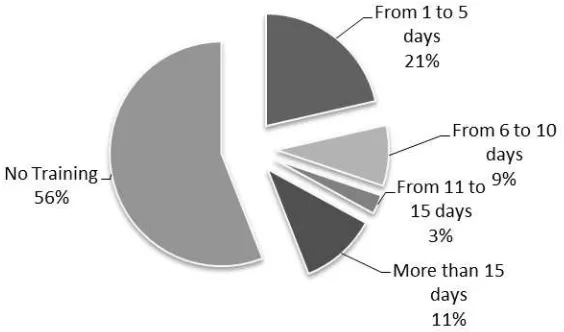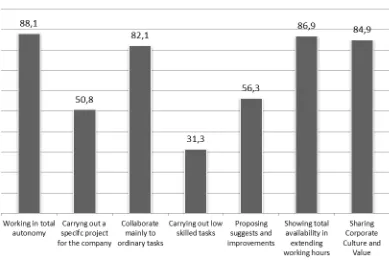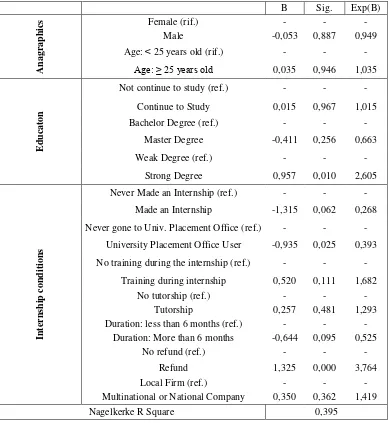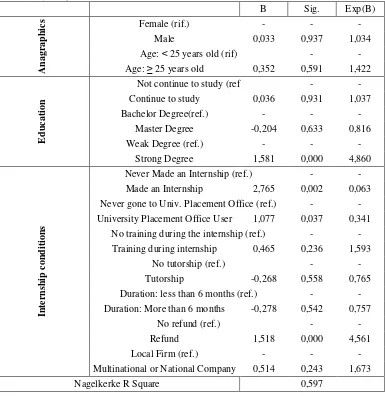Athens Institute for Education and Research
ATINER
ATINER's Conference Paper Series
SOC2014-0937
Davide Arcidiacono
Researcher
University of Catania
Italy
Post-Graduation Internship
Athens Institute for Education and Research 8 Valaoritou Street, Kolonaki, 10671 Athens, Greece
Tel: + 30 210 3634210 Fax: + 30 210 3634209 Email: [email protected] URL: www.atiner.gr URL Conference Papers Series: www.atiner.gr/papers.htm
Printed in Athens, Greece by the Athens Institute for Education and Research. All rights reserved. Reproduction is allowed for non-commercial purposes if the
source is fully acknowledged.
ISSN: 2241-2891
An Introduction to
ATINER's Conference Paper Series
ATINER started to publish this conference papers series in 2012. It includes only the
papers submitted for publication after they were presented at one of the conferences
organized by our Institute every year. The papers published in the series have not been
refereed and are published as they were submitted by the author. The series serves two
purposes. First, we want to disseminate the information as fast as possible. Second, by
doing so, the authors can receive comments useful to revise their papers before they
are considered for publication in one of ATINER's books, following our standard
procedures of a blind review.
Dr. Gregory T. Papanikos President
This paper should be cited as follows:
Arcidiacono D., (2014) "Post-Graduation Internship between Exploitation
and Training: A Research on the Italian Experience" Athens: ATINER'S
Post-Graduation Internship between Exploitation and
Training: A Research on the Italian Experience
Davide Arcidiacono Researcher University of Catania
Italy
Abstract
The research is an analysis about conditions and regulatory forms of internship, providing empirical evidence on the case of post-graduate internships carried out in Italy in the last two years, trying to assess the quality of the learning environment where the interns worked and the effectiveness of internship in guiding and promoting the employability of graduates. The study is based on the results collected through a sample of graduates between 2011 and 2012 (N = 1154) using the CAWI method. First, data highlight how interns are in
a condition of “role ambiguity” in which there is a clear contrast about
the clearness of information and conditions in which they operate and the expectations of bosses and colleagues about the tasks to be performed. Nevertheless, interns do not get adequate training input, they remain confined to limited aspects of their job and they do not got an overall knowledge of business activities, that in some way could
limit their operational capacity and understanding of the “production”
processes in the company. More problematic, however, is the impact of internship on employability. The weak capability of post graduate internship to promote employability has to be contextualized considering the peculiarities of the local labor market of a South-European country, mostly characterized by micro- entrepreneurship, family business, above all in the service sector with low added value and with a high tendency to use informal work.
Key Words: job mismatch; school to work transitions; learning on the
job; overeducation; job placement.
Introduction
One of the objectives of European Strategy for employment of young people, particularly those highly skilled, has always been encouraging the school-work alternation (Muller & Gangl, 2003, Walther, 2006). Similarly, one of the priority objectives of the Bologna Process, and the growing debate about the employability of graduates, was getting closer education and firms, particularly in Mediterranean countries, which tertiary educational systems have been often accused of self-referentiality and misalignment to the needs of labor demand (Regini, 2010). Therefore, internship, as a means of alternation, plays a double role: on one hand, it encourages the acquisition of technical skills combining learning by absorbing with learning by doing or by interacting; from another hand, it would contribute to the construction of a professional self, as a moment of recognition of the value and limitations of the skills possessed, helping to curb the phenomena of over-education and job mismatch between demand and supply of skilled labor forces. These functions, guidance and active learning, become even more essential at a time when career of educated people are becoming more complicated, fragmented and uncertain (Standing, 2011). The reference model in Europe continues to be the German "dualistic system", very expensive and difficult to replicate in different contexts, but capable to establish cooperative relations and exchanges with the business system to train more specialized and suitable skills. However, the institutional framework of internship in Mediterranean country, like Italy, is
really ambiguous because norms and actors don’t define clearly if it is a
training time or a work experience, respect to the French model, where it is strictly linked to a training path, or the anglo-saxon “open market” model, where internships are considered more clearly as an entry level job. Strengthening internship get in crisis the pedagogical "two times" model, typical of country like Italy, which clearly separates the moment of education from the moment of work. Now, internship become more and more a signal or an access credential (Spence, 1973; Collins, 1972; Hanson et al., 2013) to the labor market, also contributing to the building of those weak ties that are at the basis for success in job searching (Granovetter, 1973; Mouw, 2003).
of school-work transition to ensure a better employability of young people, University of Catania. The administration of the questionnaire was done using the Cawi Method. For the analysis of the relationship between training and employability, we proceeded to construct a binary regression model, accepting relations with a significance level of ≤ 0.05.
The survey, although a local study, it may be useful to put in question the value of internship instrument considering at the same time the peculiarity of national model of regulation and currently considering the constraints that may emerge in a Southern reality, characterized by higher unemployment of educated people and with considerable disparities both in terms of efficiency and dynamism of the economic system (Reyneri & Pintaldi, 2013; Avola & Cortese, 2013). Moreover, the local dimension of the survey appears as an advantage for evaluating how the processes of coercive isomorphism and convergence at European level face with the attributes and the socio-institutional environment of a certain territory.
Internship in Italy: Conditions and Effects
The Learning Environment
A first element to examine the real value of the internship is the learning environment in which the interns have to work.
look to interests and possible future investment company (only in 27% of cases) in areas where the inclusion of new skilled labor forces may play an important role also in the production of innovation. In addition, only in 20% of cases there was a co-construction and a real collaboration between firms and the promoter of the internship, like University, as expected and desirable considering the provision of the recent university reform and the recent national guidelines on internships.
Data show also a low level of corporate investment on training activities for trainees. The interns interviewed have no problem to say that in almost half the cases there was not any form of training when they start their experience inside the firm (Figure 1) and there has been entrusted for the most part by tutoring and direct practice on the job. Other forms of training appear less used in the analyzed sample, above all that are more geared to the acquisition of knowledge about the overall strategies and internal work processes, such as company visits (used in approximately 20% of cases) or job rotation experience (only 13% of trainees). If we also look at the content of this training, it is not surprising that almost all the trainees converge on technical skills related to the task and the reality of the host firm (firm-specific), and only a residual seems to concern skills (such as language skills or computer) expendable outside the company (less than 40% of the cases), or skills related to the overall management of the company that can help the trainee in a deeper understanding of business dynamics and processes (organizational culture and values , but also products, markets and strategies) which covers about only 30% of the interns interviewed.
Figure 1. How many Days were dedicated to Training Input (%)
Furthermore, data highlight how they are not always mentored concretely to the specific company tutor (only in 35% of cases), specifically named in the training program, but rather directly to the head of the office (37 %) or the person who manages the relationships between companies and universities or the HR Manager (28%).
with high responsibility with respect to a specific project assigned, showing high availability to extend working time, as well as a total membership with the corporate culture. Less space seems to be left at the creative dimension or a proactive management, albeit within a high qualification of the assigned tasks. However, for such a commitment does not always corresponds adequate recognition in terms of integration of the trainee within the company: 51.9% have never been involved in an internal course reserved to all other employees, and 43.1% has not been granted access to some facilities or structures of the company, while almost a third have never had the chance to use software or tools reserved for normal employee or also a 30% was excluded from meetings and conferences.
Figure 2.During an Internship, an Intern has to… (multiple choice-%)
However, in a learning environment not always easy, interns in almost 70% of the cases declare to be satisfied with their training experience in terms of the skills learned, but more than 50% define it is not very useful from the point of view of finding a job.
The Employability of Interns
The trainees interviewed declared that 86% of them did not receive any proposal of employment at the end of this experience. The remaining 14% is made up of 11% who accepted this proposal and a 3% that rejected it because it was less skilled compared to their educational credentials or because it had
been proposed to work without a contract. The 74% doesn’t work currently, and only 6% work in the same company where they made the internship, which is associated with a further 7% claiming to work at least in the same industry. The remaining 13% is divided between those who preferred a path of self-employment and those who have found work experimenting with entirely new paths. Having obtained a degree in 2011 or 2012 does not seem to have any effect on the current condition of employment (27.4% of graduates in 2012 work compared with 25% of those in 2011).
In relation to the probability of being currently employed (Table 1), the values of the regression model calculated would show as between employability and internship there would be a negative relationship, albeit with a very low level of significance. The same thing goes for the internships activated with the support of University Placement Office. The employability
of graduates would be more traditionally linked to the “strength” of their
studies (b : 0.95 sig: 0.01): who has a degree in economics, engineering and medicine is employed more easily without making an internship, rather the provision of a period of extracurricular training may restrict or delay the entry opportunities on the labor market. However, certain conditions peculiar to the apprenticeship can play a positive role in employability of graduates, not so much the business features but rather the presence of a refund for the training activities carried out. Multivariate analysis , in fact , shows that the presence of a refund for the internship increase the probability of being employed (b:1.32 sig:0.00), demonstrating that this aspect represents not only a symbolic issue but a discriminating factor about the real quality of the experience that demonstrates the concrete commitment of the company in human resource training and its potential interest for recruiting interns.
or have better employment conditions, but he get most frequently a more congruent job with his studies.
Table 1. Binary Logistic Regression- Probability to be actually employed
B Sig. Exp(B)
University Placement Office User -0,935 0,025 0,393
No training during the internship (ref.) - - -
Training during internship 0,520 0,111 1,682
No tutorship (ref.) - - -
Multinational or National Company 0,350 0,362 1,419
Table 2. Binary Logistic Regression- Probability to get a Congruent with the University Placement Office User 1,077 0,037 0,341
No training during the internship (ref.) - - Training during internship 0,465 0,236 1,593
No tutorship (ref.) - -
Multinational or National Company 0,514 0,243 1,673
Nagelkerke R Square 0,597
Conclusive Rermarks
appointed, which may not correspond to the characteristics of the role to play, or it can bind insider/outsider dynamic (Lindbeck & Snower, 1988). A tutor, as insider, may perceive trainees as entrants and he fears that their presence could threat his position in the company. Therefore, it would be convenient to relegate the trainee in marginal functions limiting his coaching to a minimum, hindering the learning processes that should be supported. The figure is alarming in light of the shortcomings of the Italian system of monitoring and certification of skills acquired during the internship. Unlike the German model, the end of the internship is not subject to any real test of the skills learned. The legislation requires that the skills acquired during the training period are included in the so-called training booklet, a personal document prepared in electronic and printed form on which all the skills acquired, also during an
internship, could be recorded. This so called “Europass model”, defined by the
Lisbon Strategy, after a trial period in 2010 in Italy, still suffers from a legal vacuum on the release mode, and the validation and identification of subjects that have to release it in the country. Moreover, data seem to confirm how trainees in the company live in a condition of role ambiguity, in which there is insufficient clarity about the information and the conditions in which they operate and expectations of bosses and colleagues respect to their tasks (Kahn et al., 1994). On one hand, it is expected that the inter will behave already as an internal resource but at the same time the conditions in which he operates seem to underline his status of extraneous. In particular, the analyzed data show that companies expect from trainees a full commitment to the values and the corporate culture, a total willingness to extend working times or extend the content of their job, as well as the ability to work independently, similar in all what they would expect from a regular employee according to a mutual exchange of obligations and rights which are defined in the "phsycological contract" (Snehal & Rousseau, 1998). In practice, however, interns does not receive adequate training input, they remain confined to limited aspects of their job, failed to cross-cutting issues and overall knowledge on operating business, that somehow restrict their operational capability and understanding of production processes inside the company. A weak job coaching and supervision, combined with the exclusion from meetings or events or corporate training, or lack of access to facilities, tools and services reserved for the internal staff can help to strengthen their uncomfortable condition.
studies, can depend by the dynamics of a local labor market that often can mortify abilities and expectations of the younger educated workforce, as in the case of Southern Italy. An extracurricular training after graduation seem to restrict or delay the entry opportunities on the labor market, even if, the experience of the internship, through the mediation office placement, would lead to a lower risk of over-education and it would protect more the public and private investments in human capital.
In conclusion, training and monitoring of internships activities, less faced by the recent Italian reform, still remain the main critical aspects of this
experience. First of all it’s necessary empowering the involvement of the internship promoter, like labor agencies or University Placement Office, as guarantor of the quality of its learning worth. In fact, the conditions of the internship and its training value should be guaranteed both through increased attention to the choice of the company tutor to whom is entrusted the intern, also providing guidelines on tutorship, as in the case of Ireland, but also through a greater power of inspection and monitoring by the promoter, which in cases of misuse may decide to suspend or not to renew the agreement with the company. On this aspect, the legislator should intervene, as we can see in the recent Council Recommendation on a Quality Framework for Traineeship also, defining in detail a quality standard for internship and a system of the evaluation of this experience (through, for example, an exit interview or drafting a letter of reference, typical of the Anglo-Saxon model, or through the preparation of a certificate of competence, as in the French case, or a final exam that tests how much you really learned, as in the German case).
References
Adapt, 2013, La regolazione dei tirocini formativi in Italia dopo la legge Fornero, Adapt e-book vol. 16, Adapt University Press, Bergamo, BG.
Avola, M. Cortese, A., 2013, Istruzione e qualità dell’occupazione in Sicilia. Sprechi di capitale umano fra vincoli strutturali e irresponsabilità pubbliche. Scuola Democratica 2 (2): 379-400.
Collins, R., 1972, The credential society. Academic Press, New York, NY
Granovetter, M, 1973, The Strength of Weak Ties. American Journal of Sociology 78(2): 1360-1380.
Hanson, A.R. Carnevale, A. Gulish, A., 2013, Failure to launch. Structural Shifts and the new Lost Generation, Full Report Georgetown University, Washington, WA. Kahn, R. L. Wolfe, D. M., Quinn, P. R., Rosenthal, R., Snoek, D. J. A., 1964,
Organizational Stress. Studies on Role Conflict and Ambiguity. New York: Wiley and Son, New York, NY.
Lindbeck, A. Snower, D., 1988, The Insider-Outsider Theory of Employment and Unemployment, MIT Press, Cambridge,
McKinsey., 2012, Education to Employment: Getting Europe’s Youth into Work, McK Report, Bruxelles, BRU.
Muller, W. Gangl, M., 2003, Transitions from education to work in Europe. The integration of Youth in EU Labour Markets. Oxford University Press, New York, NY.
Peschner, J., 2013, Traineeships in Europe – their quality, their impact on labour market, outcomes, Eurobarometer 378, Bruxelles, BRU.
Regini, M. (2010). European Universities and the Challenge of the Market: A Comparative Analysis. Edward Elgar, London.
Reyneri, E. Pintaldi, F., 2013, Dieci domande sul mercato del lavoro in crisi., Il Mulino, Bologna, BO.
Rousseau, D. Snehal, A., 1998, 'Assessing psychological contracts: issues, alternatives and measures'. Journal of Organizational Behavior, 19(1): 679-695.
Spence, M., 1973, 'Job Market Signaling'. The Quarterly Journal of Economics, 87 (3): 355-374.
Standing, G., 2011, The Precariat. The new dangerous class, Bloomsbury Publishing, London.



